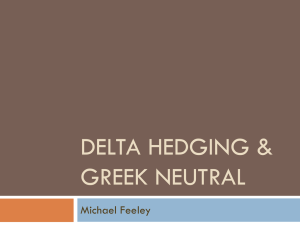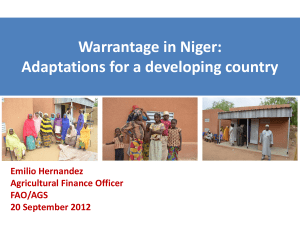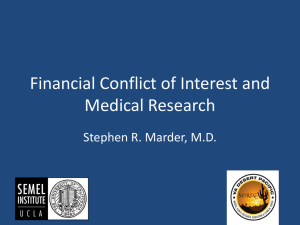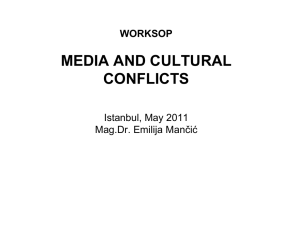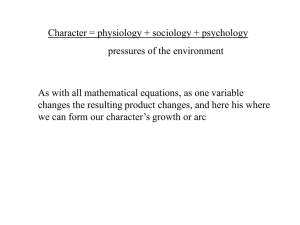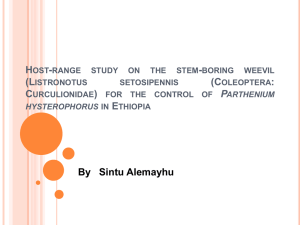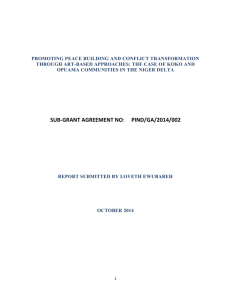IMPACTS OF CONFLICTS ON INVESTMENTS IN AGRICULTURE
advertisement
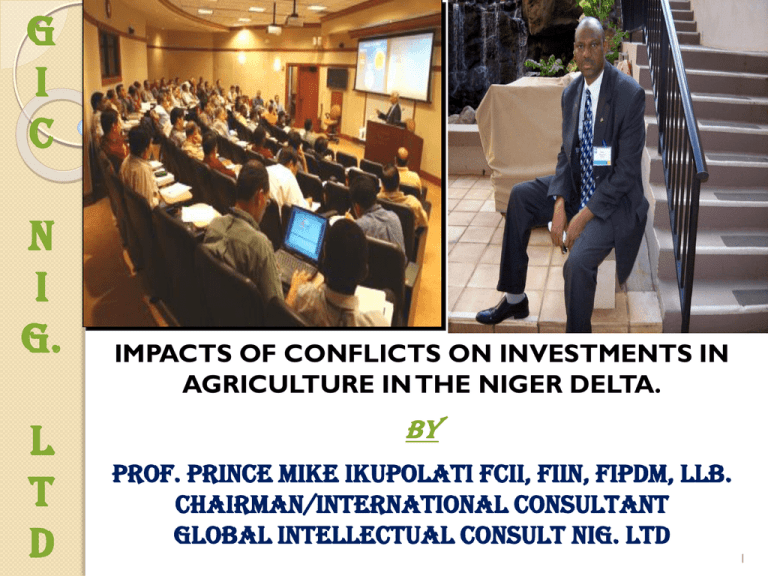
G I C N I g. L T d IMPACTS OF CONFLICTS ON INVESTMENTS IN AGRICULTURE IN THE NIGER DELTA. By Prof. prince Mike Ikupolati fcii, fiin, fipdm, llb. Chairman/international consultant Global intellectual consult nig. Ltd 1 G I C N I G L T d WHAT IS CONFLICT? Conflict refers to some form of friction, disagreement, or discord arising within a group when the beliefs or actions of one or more members of the group are either resisted by or unacceptable to one or more members of another group. The following common elements in the definitions of conflict: a) b) c) d) There are recognized opposing interests between parties in a zero-sum situation; There must be a belief by each side that the other one is or will act against them; This belief is likely to be justified by actions taken; Conflict is a process, having developed from their past interactions. 2 G I C N I G L T d NATURE OF CONFLICT IN THE NIGER DELTA Conflicts in the Niger Delta include: 1) Inter-communal conflicts 2) Inter- tribal conflicts 3) Inter- ethnic conflicts 4) Militancy conflicts 5) Pastoral vs. farmer conflicts These conflicts are in form of: a) Man against Man Conflicts b) Man against Nature Conflicts and c) Man against Self Conflicts. 3 G I C N I G L T d WHAT IS CONFLICT? Causes of conflicts in the Niger Delta: 1) Competition for Oil Wealth since the 1990s. 2) Militarization of the region by local militia groups. 3) Oil spillage affecting farmers’ land Fishermen’ water fronts. 4) Environmental degradation resulting from activities of the foreign Oil companies in the Region. 5) Siphoning of Oil from Pipelines and Wells. 6) Social Unrest by Youths who are mainly unemployed. 7) Ignorance resulting from mass illiteracy. 8) Bad leadership and poor governance. But the farmers need to reclaim their livelihood!!! 4 G I C N I G WHAT IS CONFLICT? a) b) c) d) L T d e) Conflicts and Investments in Agriculture: Farm looting by criminals who are mostly youths. Perennial harassments of farmers by the youths demanding land royalties. Environmental and Industrial pollution resulting from activities of hoodlums. Poachers activities causing insecurity of farms. Perennial crisis causes loss of interest by investor both local and foreign. f) 5 G I C N I G L T d WHAT IS CONFLICT? The resultant effect of all these is widespread Poverty, which in itself causes conflict and conflict again leads to more poverty. The circle continues. POVERTY CONFLICT We therefore need peace in the Niger Delta to avoid the recurrences of conflicts. 6 G I C N I G L T d CURRENT STATE OF INVESTMENTS IN AGRICULTURE Type of Investment NC NE NW SE SS SW ALL Foreign private 0 0.2 0.6 0.3 0.8 0.1 0.3 Foreign public 0 -0.1 0.3 0.3 0.5 -0.1 0.2 Domestic private 0 0.4 0.3 0.6 0.4 0.4 0.4 Domestic public -0.1 -0.2 0.3 0.5 -0.4 -0.1 0 Note: Negative (-) values imply decreasing investment; Positive (+) values imply increasing investment Zero means no change in investment. Upper limit is +1 and lower limit is –1. Key: NC=North Central; NE=North East; NW=North West; SE=South East; SS=South South; SW=South West 7 G I C N I G L T d CURRENT STATE OF INVESTMENTS IN AGRICULTURE Foreign Private Investment in Agriculture Zone Rank Positive Reasons Negative Reasons North Central 2.5 Democratic governance Availability of raw materials Adequate policy support Natural resource endowment Political instability, Political discrimination, Dishonesty, Poor technology, Low policy effectiveness North East 4.0 Large local market, Corruption Abundant resources, Abundant Insecurity opportunities, High returns on investment, Bureaucratic bottlenecks Democratic governance North West 3.4 Favourable political climate, Raw materials availability, High demand, Resource endowment, Comparative advantage Insecurity, Political instability, Poor infrastructure, Naira devaluation, Low investment opportunities South East 2.5 Resources availability, Ban on agricultural commodity import Political/religious/ethnic strife, Political instability, Unfavourable political climate South South 2.4 Democracy Economic/political stability Raw material availability Bad roads, insecurity/violence, Political instability, corruption, Greed/fraud, High dependency on oil revenue, poor electricity and water supply, policy inconsistency South West 3.3 Low labour cost, High investment opportunities, Conducive atmosphere, Security of investors. Insecurity Poor attitude to work Policy inconsistency Political instability G I C N I G L T d Domestic Private Investment in Agriculture Zone Rank Positive Reasons Negative Reasons North Central 4.1 Good policies, Raw material availability, Availability of markets, Good economic environment, Good indigenous technologies Poor infrastructure Low technology Poor policy effectiveness North East 5.0 Large domestic market, Abundant raw materials, High returns on investment, resource endowment, Democratic governance, abundant opportunities Corruption Insecurity Bureaucratic bottlenecks North West Good policies, Good economic climate, resource availability, cheap labour, political stability, Adequate funding, High local demand, Salary/wage increase Smuggling, Political instability, Poor infrastructure, Poor policy implementation, Low returns on investment, Paucity of funds South East 3.1 Good investment promoting policies, establishment of ADPs, availability of improved crop varieties Unfavourable political climate High interest rate on loans South South 3.3 Increase in workers wages Availability of raw materials Improved local production technology Economic/political stability Patriotism Bad roads, Insecurity/robbery, Poor infrastructure, Corruption, Poor policy, Enforcement policy Reversals, Advanced fee fraud (419) Poor security system, Lack of protective policy South West 3.3 High potential profit Familiarity with market Large local market High investment opportunity Inadequate infrastructure Lack of adequate capital Underperformance of utilities, Political instability, high 3.6 G I C N I G L T d INVESTMENTS IN AGRICULTURE AND CONFLICT MITIGATION As concluded in a study commissioned by Future Harvest, a foundation established by former US President Jimmy Carter, "rehabilitation of agriculture is a central condition for development, reducing poverty, preventing environmental destruction - and for reducing violence. Poor conditions for agriculture hold grave implications for socio-economic development and sustainable peace. Just as good governance is crucial to building healthy conditions for agriculture, and thus breaking the vicious cycle of poverty, scarcity and violence. 10 G I C N I G L T d INVESTMENTS IN AGRICULTURE AND CONFLICT MITIGATION HE Ellen Johnson-Sirleaf, President of Liberia once said “It is very clear to us that agriculture has the potential to become a major source of employment, most especially for the thousands of our citizens, especially women and youth who, as casualties of the war, lack essential skills, but who can learn to farm the land. Our objective is to consolidate them into a productive and dynamic entity for national development. Jobs in the farming sector is one of the means of accomplishing that aim...We can become a post conflict success story building upon our agriculture activities”. 11 G I C N I G L T d INVESTMENT IN AGRICULTURE AND CONFLICT MITIGATION These four areas for consideration for an action agenda by stakeholders are: a) Conflict prevention through investments in agriculture. b) A protection agenda for agriculture in Niger Delta Region. c) The regeneration of the fabric of societies through massive investment in agriculture in the Niger Delta after the protracted crises. d) A robust knowledge management and research agenda for the people of the Niger Delta, especially the youths and Women. 12 G I C INVESTMENTS IN AGRICULTURE AND CONFLICT MITIGATION a) N I G L T d b) c) Investing heavily in Agriculture literally will; Brings new life to shattered homes and communities in the Niger Delta, Serves as a motivating rationale for bringing people together where conflict has torn social networks asunder and restarts a key economic engine to drive recovery. The level of investment in agriculture is positively correlated with food security and poverty reduction, hence investment in Agriculture will guaranty food security and reduce poverty in the Region. 13 G I C N I G L T d INVESTMENTS IN AGRICULTURE AND CONFLICT MITIGATION d) e) f) g) Investments in Agriculture Research Institutions in the Niger Delta with a vibrant extension worker services to disseminate and train farmers will help to reduce tension and communal conflicts. Investment in Agricultural MSMS Enterprises will help to provide jobs for women and the youths and reduce the heavy demand on oil companies and large scale farmers. A heavy investment in Agriculture will reduce food insecurity and poverty among the rural dwellers and thus reduced poverty-induced crimes in the Niger Delta. Investments in Agriculture will make Farming attractive to the youths and rural populace thereby eliminating idleness and unemployment induced conflicts. 14 G I C N I G L T d CONCLUSION In summary; The peace dividend in the Niger Delta is not a magic wand. Realizing the peace dividend is not an automatic process, but one that depends on choices made by relevant actors, not least by Peace Practitioners, Private Sector investors, Government Actors in Agriculture in the Niger Delta. Stakeholders have to consider improving their investments in Agriculture in the Niger Delta as a means of eliminating or reducing to the barest minimum conflicts in The Niger Delta. Stakeholders must make these long-term commitments to support the process of realizing these dividends. 15


